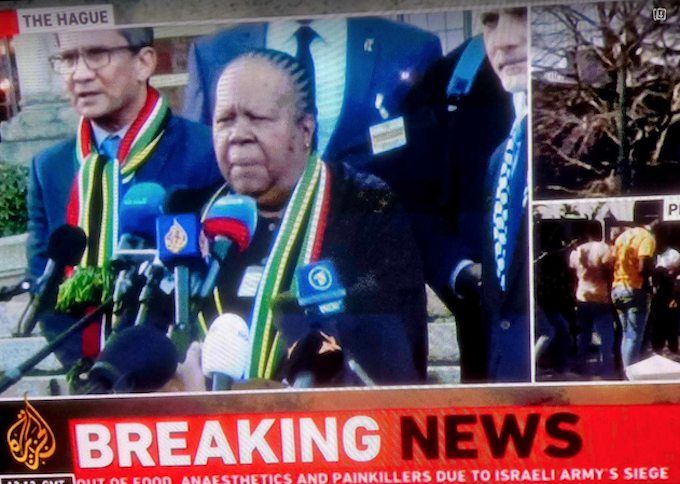
The International Court of Justice (ICJ) has ordered Israel to take steps to prevent acts of genocide in South Africa’s case over the war on the Gaza Strip.
But it stopped short of ordering a ceasefire in what is being seen as a historical ruling on emergency measures requested by the South African government which analysts say will put pressure on Tel Aviv and its Western backers.
The ICJ, also known as the World Court, ordered Israel to take measures to prevent and punish direct incitement of genocide, and also to take immediate, effective measures to enable provision of urgently needed basic services and humanitarian assistance in the besieged enclave.
Hailing the emergency measures as a victory for international law, South African Minister of International Relations Dr Naledi Pandor said outside the court in The Hague that Israel would have to halt fighting in Gaza if it wanted to adhere to the orders of the United Nations’ top court.
“How else is it going to comply with the ruling?” she asked, adding that it was up to the global community to ensure the measures were applied to “stop the suffering of the Palestinian people”.
“How do you provide aid and water without a ceasefire?” Dr Pandor said.
“If you read the order, by implication a ceasefire must happen.”
In South Africa, government officials welcomed the ruling.
“It’s a watershed judgment for all those who want to see peace in Palestine,” Fikile Mbalula, secretary-general of the ruling African National Congress party, told reporters.
Palestinian human rights attorney @dianabuttu reacts to the ICJ ruling on Gaza: “This court has overwhelmingly decided in favor of South Africa, has overwhelmingly determined that there is plausible risk of genocide, and it becomes imperative upon the world community to now act.” pic.twitter.com/eXQuyIBlbA
— Democracy Now! (@democracynow) January 26, 2024
Years to decide
The ICJ judges have not yet ruled on the merits of the genocide allegations, which may take years to decide. However, a big majority of the judges ruled that South Africa had presented a “plausible case” with its genocide allegations that led to the emergency measures.
Since October 7 when Hamas launched a deadly raid on Israel, Tel Aviv’s military campaign has killed at least 26,083 people and wounded 64,487 others, according to officials in Gaza. Thousands more are missing under the rubble, most of them presumed dead.
Al Jazeera’s senior analyst Marwan Bishara told the network that “Israel is on trial for genocide”, saying that the provisional ruling would cause a seismic split between the Global North and South depending on which side people aligned, even if the ICJ had not called for an immediate ceasefire.
He said Israel’s major backer, the United States, which had vetoed three UN Security Council resolutions seeking a ceasefire in recent months, now needed to “look in the mirror”.
“The UK, Germany and other countries who supported Israel in the past three months unconditionally also need to look in the mirror and reconsider their decision because the World Court has taken up the case of genocide against Israel for its actions in the past three months,” Bishara said.
The principle outcome was that the ICJ would take on the case and had put Israel “on notice” and demand that the state carry out a number of steps.
“I think that legally and morally sends a strong message to Israel and its backers that they need to cease and desist — even if the court did not spell it out.”
International Court of Justice preliminary ruling: “Israel’s actions in Gaza may constitute genocide.” pic.twitter.com/ArtpoFbZ3M
— PALESTINE ONLINE 🇵🇸 (@OnlinePalEng) January 26, 2024
Plausible case of genocide
Thomas Macmanus, director of international state crime initiative at Queen Mary University of London, stressed that the court had said there “is a plausible case of genocide in Gaza”.
“So, we now have a serious risk of genocide,” he said, noting that the law stipulated that once there is “a serious risk”, then states needed to do “everything they can to stop enabling that genocide and to start taking all action in their capacity to prevent it”.
Riyadh al-Maliki, Palestinian Minister of Foreign Affairs, issued a statement welcoming the ICJ’s provisional measures “in light of the incontrovertible evidence presented to the court about the unfolding genocide”.
“The ICJ ruling is an important reminder that no state is above the law or beyond the reach of justice. It breaks Israel’s entrenched culture of criminality and impunity, which has characterised its decades-long occupation, dispossession, persecution, and apartheid in Palestine.”
Far-right Israeli National Security Minister Itamar Ben-Gvir mocked the ICJ after the court ended its reading.
“Hague shmague,” the minister wrote on X, formerly Twitter, in the first comments by an Israeli official.
All of those genocidal statements including that of Palestinians being human animals. Well here they are being quoted again to the world by Judge Donoghue at the ICJ. #ICJGazaGenocide pic.twitter.com/RmBQRBInU3
— Ayesha Omar 🇿🇦 (@DrAyeshaOmar) January 26, 2024













































